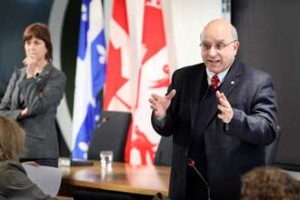
By Neale McDevitt
The Feb. 16 Town Hall on the challenges faced by McGill as a result of the global economic downturn was marked by an overriding spirit of co-operation, collaboration and level-headed give-and-take in which Principal Heather Munroe-Blum and Provost Anthony Masi asked as many questions of participants as they fielded themselves.
Telling the 50 people gathered in the the Faculty of Education’s Jack Cram Auditorium that he was “neither a Polyanna, nor a Cassandra,” Masi outlined the reality of what he called the “rainy, stormy, perfect [economic] storm” confronting McGill.
Already running deficit budgets to support “the quality of programs we offer, the people we attract and the reputation of the University,” McGill has been hit by the drop in market value of its endowment from some $920 million to approximately $740 million. With the endowment supplying the University with about 10 per cent of its operating budget per year, the drop in value represents a shortfall in revenues between $4 million and $8 million annually.
As well, the recent federal budget dashed hopes for projected increases in research revenue. In the same vein, Masi didn’t seem hopeful that the provincial budget slated to be tabled in the spring will be any different. “We thought the Quebec government would stay the course in terms of increasing its commitments to higher eductaion,” said the Provost, “but early indications are that it will be a flat budget with no increase.”
These factors, combined with other elements such as the fact that McGill’s 150 Canada Research Chairs have not been indexed since 2000 (which means every increase in academic salary for a CRC is not compensated by the federal government), will lead to a projected deficit of about $11 million. “That’s a big hole we have to fill,” said Masi.
To help fill that hole, McGill administration is seeking advice from the community. “We are inviting input far and wide,” Munroe-Blum told the audience. “This is not a time to be shy because we’re all in this together.”
“It might not be wise to get my suggestions,” countered Anthony Paré, Director of the Centre for the Study and Teaching of Writing. “I can’t even balance my bank book.”
But the advice did come. Deans, staff members, students and faculty offered a variety of suggestions on ways to reduce expenditures and increase revenues. Negotiating with students to pay ancilliary fees, adding a third semester in the summer, using technology to teach remotely, increasing enrolment among international students, doing away with desktop computers in lieu of laptops, even expanding the use of the Faculty Club as a source of revenue – all were raised as possible methods to help McGill ride out this storm.
The two remaining Town Halls on the Administrative Task Force on Economic Uncertainty have been scheduled for March 2, MBA Lounge, Bronfman Building, noon to 1:30 and Macdonald Campus, Raymond 2-045, 3 p.m. to 4:30. For more information on the task force go to www.mcgill.ca/economictaskforce. The task force’s blog can be found at http://blogs.mcgill.ca/economictaskforce.
